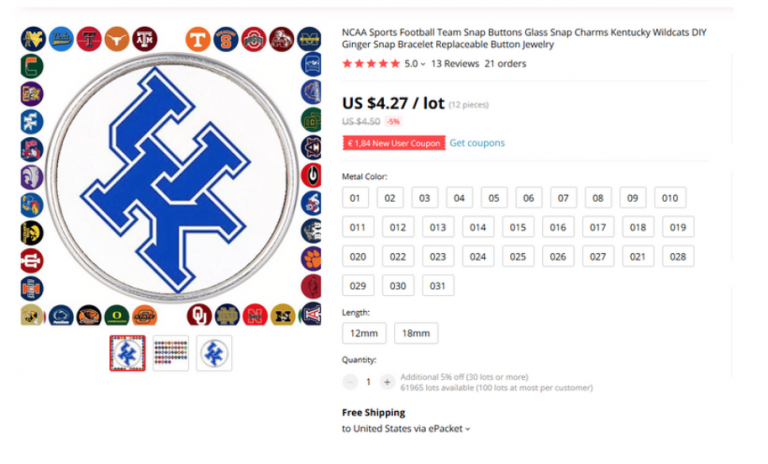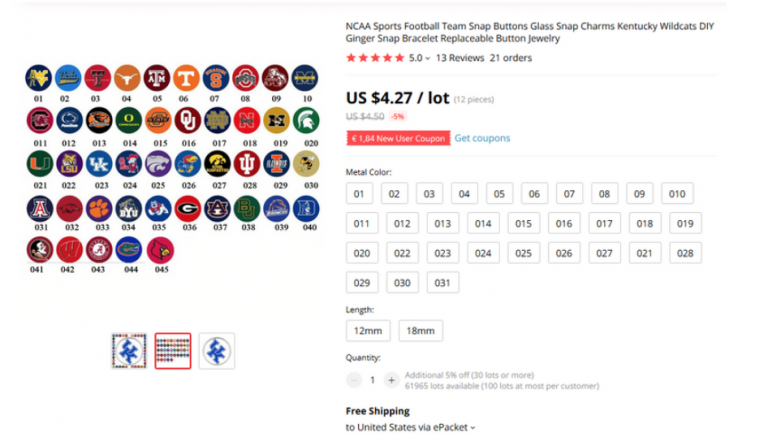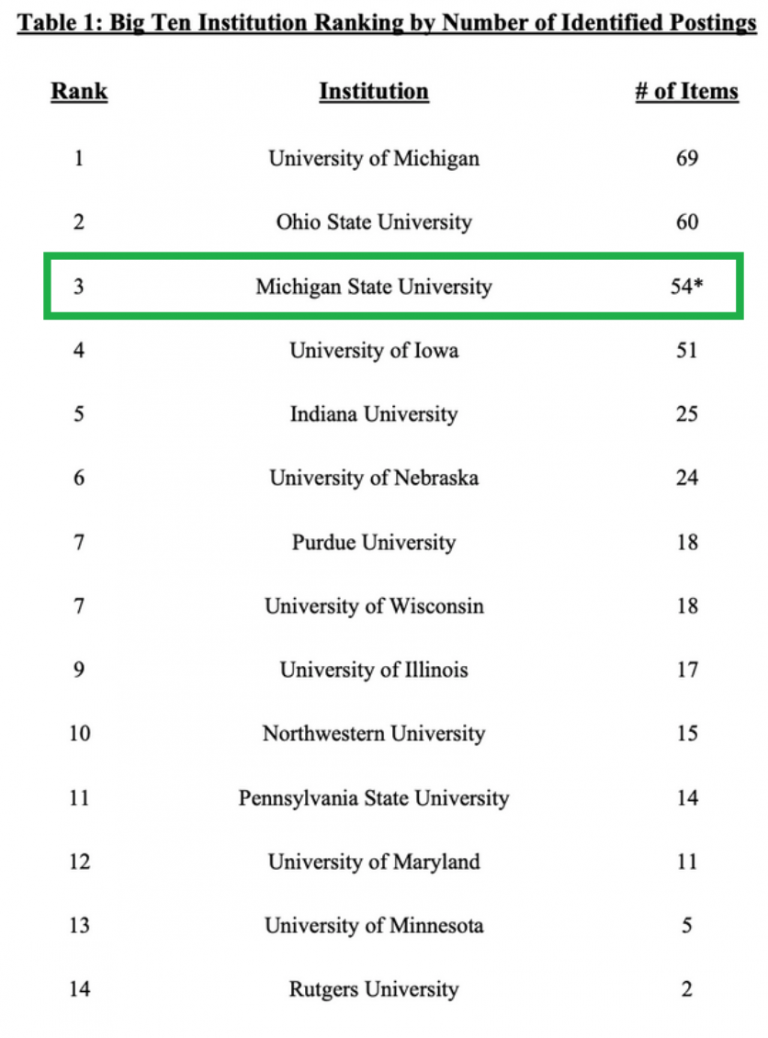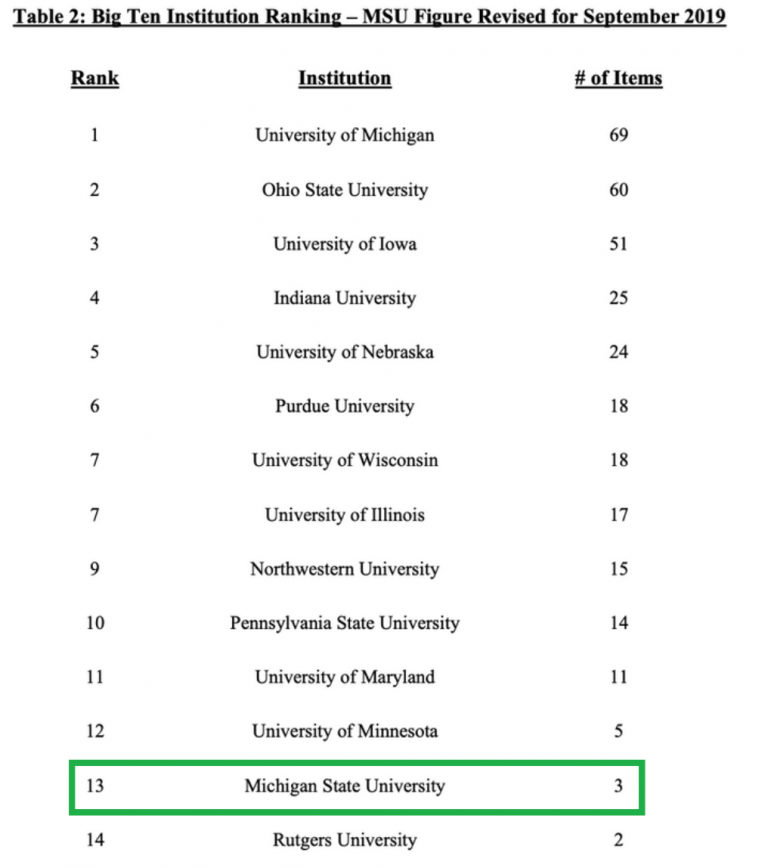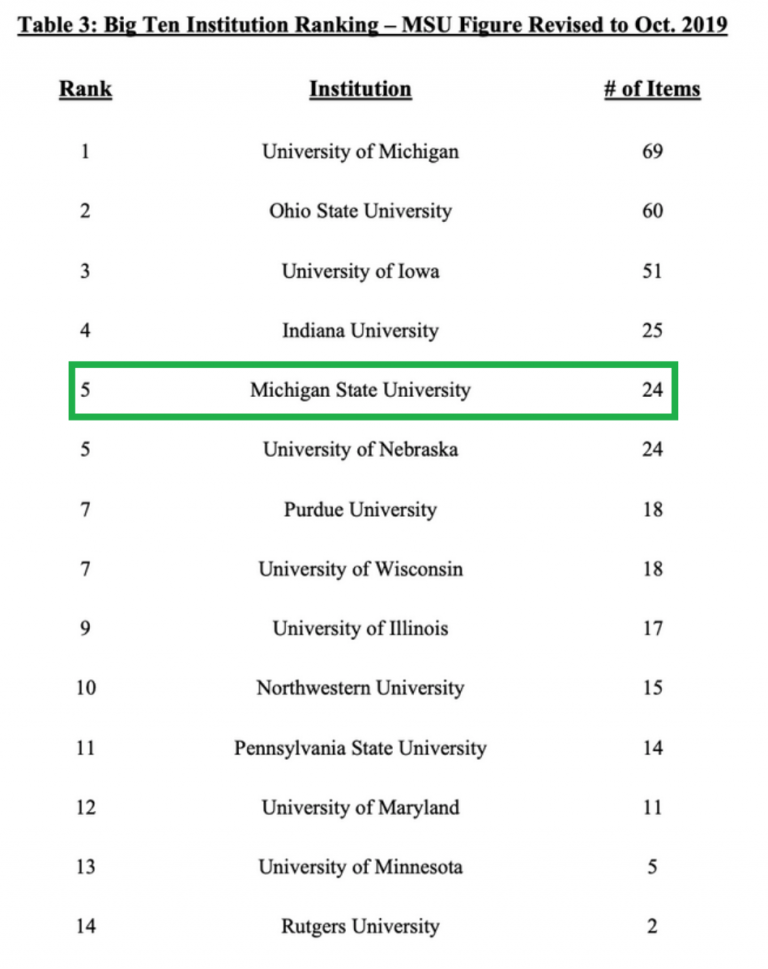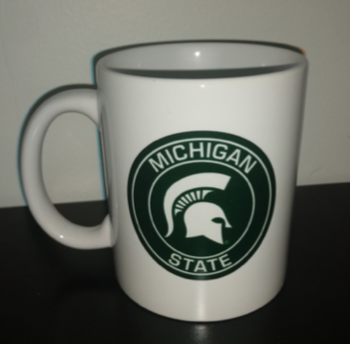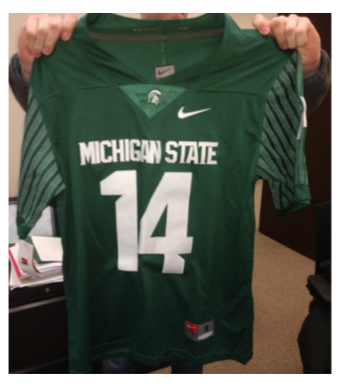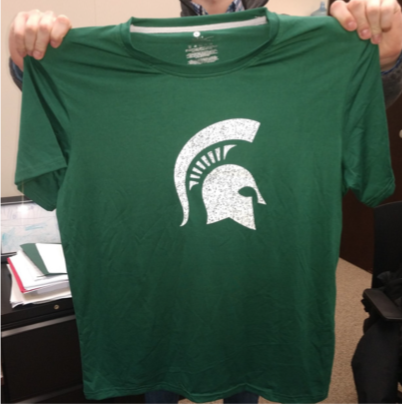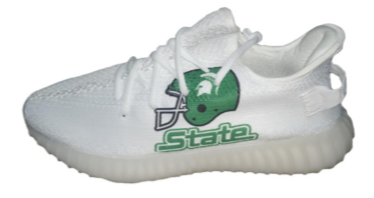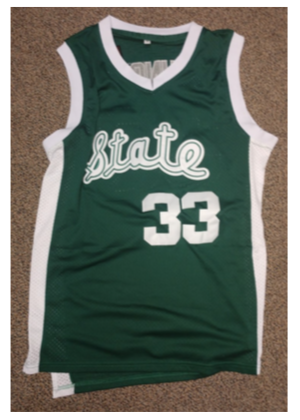MSU A-CAPP, 2020
Project Overview
Since 2017, Michigan State University (MSU) has been home to a unique and one-of-a-kind intellectual property protection partnership. MSU Licensing has collaborated with the College of Social Science’s Center for Anti-Counterfeiting and Product Protection (A-CAPP) to use the International AntiCounterfeiting Coalition’s (IACC) MarketSafe® program to help protect MSU’s intellectual property. This collaboration combines the resources and talents of multiple public and private entities to create tangible benefits for MSU as an institution, MSU students, and Spartans all over the world. The MarketSafe® Program allows MSU Licensing, through the work of A-CAPP student interns, to extend its brand protection efforts into cyberspace, reaching a breadth and depth of protection not previously possible.
Since the late spring of 2017, students interning at the A-CAPP Center have been actively engaged in this project. Under the supervision of Ms. Kari Kammel, A-CAPP’s Assistant Director for Outreach and Education, these students have used the MarketSafe® Program, which partners with the Alibaba Group, to remove infringing goods from major Chinese e-commerce platforms. More than 20 MSU undergraduate, graduate and law students have been involved in searching out illicit product postings on the Alibaba Group’s multiple e-commerce websites. As a result, MSU students have gained valuable brand protection skills and experiences that are likely to be highly valued by potential future employers.
As described on the IACC website, the MarketSafe® Program is:
A strategic collaboration between the IACC and Alibaba to create a cross-industry alliance to combat counterfeit products online. Through the program, the IACC and program participants work to identify and take down infringing listings on Alibaba platforms via an expedited removal procedure.
Formed in 1979, the International AntiCounterfeiting Coalition is a non-profit organization dedicated to combating product counterfeiting and piracy. A member-driven organization, the IACC currently boasts more than 250-member organizations from a wide range of industries, including automotive, apparel, luxury goods, pharmaceuticals, and consumer products. Additionally, IACC membership is available to law firms, investigative firms and government agencies. The IACC hosts several conferences each year that bring together law enforcement agencies, brand owners, service providers, law firms and others to discuss issues of product counterfeiting and brand protection.
The Alibaba Group is the parent company of several large e-commerce platforms including Alibaba.com, Aliexpress.com, TMall.com, Taobao.com and 1688.com. These e-commerce sites are focused on both international audiences (Alibaba.com and Aliexpress.com) and domestic consumers within China (1688.com, TMall.com and Taobao.com). Recognizing their substantial presence within e-commerce, and cognizant that counterfeiters’ misuse their sites to advertise, sell and distribute illicit goods, Alibaba undertook steps to engage with brand owners in anti-counterfeiting activities. Through the MarketSafe® Program, intellectual property rights holders (or their designees) can submit takedown requests through the IACC to the Alibaba Group. When infringement is verified, these takedown requests lead to the removal of product listings that advertise goods that violate the brand holder’s intellectual property rights.
A-CAPP Center students have focused their efforts on identifying and requesting takedowns of products that infringe upon MSU’s trademarked logos, images, branding and copyrights. As these efforts meet with success, we are finding that our search and product identification methods have needed to evolve. This is a clear indication that the partnership is working and MSU’s intellectual property is being protected as counterfeiters are having to become much more cunning to avoid detection. Moving forward, we expect that our strategies will need to continue to adapt as illicit actors will endeavor to keep ahead of our brand protection efforts. Yet, this also means that infringing goods are much more difficult to find on major Chinese e-commerce websites, which reduces the likelihood of loyal Spartans being duped into purchasing potentially dangerous, unauthentic MSU-branded products.
Activities
Searching for infringing goods has been a constantly evolving process. As our student interns found initial success in the removal of product listings, counterfeiters adapted their behavior. Initially, searches were made using general search terms related to Michigan State University, such as:
- Michigan State University
- Michigan State
- MSU
- Spartans
Often, these terms were combined (e.g., MSU Spartans) or altered slightly to increase possible hit rates. Additionally, during searches students looked for MSU logos or brands in the pictures of products advertised on the websites searched. A collection of the type of images for which they searched is displayed below. Initial searches were primarily conducted through the Alibaba.com and Aliexpress.com websites, yet subsequent searches have grown to encompass other Alibaba Group websites.
Most recently search terms have expanded to include non-MSU specific terms because A-CAPP Center students found that MSU-branded products were being sold alongside other universities’ products. Recently used search terms that yielded success in identifying MSU-branded products include: college basketball, NCAA, Big Ten, college football and college sports. Additionally, these terms have been translated into Chinese to facilitate searches on Chinese-language e-commerce sites. Finally, our students have begun exploring postings that list products for multiple universities, which has led to the successful identification of MSU-branded goods that are advertised as part of a larger body of branded goods offered by a seller. An example of such a posting is shown below.
The new search activities undertaken are likely to become more labor intensive and require deep searches of individual postings as our previous activities were successful in identifying and removing the “low hanging fruit”. As such, we expect that our students will become quite adept at identifying latent trends used by counterfeiters to sell MSU products in an inconspicuous manner. Importantly, we have begun cataloging these methodologies so that new students can be trained in the most current search methods, as well as our basic search methodologies, thereby increasing their efficiency and reducing any learning curves that might inhibit our ability to remain at peak levels of guardianship.
Results
A-CAPP student interns have been responsible for the removal of more than 1250 postings of illicitly-branded MSU products found on Alibaba Group e-commerce websites. Our most recent searches highlight the fact that the quantity of conspicuous postings remains low. For example, in August of 2019, a search of the Alibaba.com and Aliexpress.com websites identified a total of three illicit postings. By the end of October, searches of all five Alibaba Group e-commerce sites identified 26 illicit postings across the Taobao.com, TMall.com and Aliexpress.com websites. Takedown requests have been submitted for each of these products. While the outcomes of these removal requests are still pending, none have been denied by the MarketSafe® Program and none have been objected to by the parties listing the infringing goods. Relatedly, the success of future takedown requests will depend upon MSU’s efforts to register its trademarks with the proper foreign authorities. Without appropriate trademark registrations e-commerce sites are generally unable to assist with enforcement efforts.
As mentioned above, the nature of our searches has changed as we have met with success in the removal of infringing product postings. Most notably, our student interns have begun to switch to a search strategy that first looks broadly for university-branded products, then digs deeper to see if MSU products are promoted alongside other universities’ products. An example of this is shown in Figures 1 and 2, which are displayed on the following page. In Figure 1, you will see a screen capture taken from the Aliexpress.com website, which advertises “NCAA Sports Football Snap Buttons” with the product description naming “Kentucky Wildcats” and the picture showing a large image of the University of Kentucky logo along with the logos for several other universities.
What you will also notice about Figure 1 is that the MSU Spartan logo is not displayed among the universities advertised in this posting. However, Figure 2 displays a second image that customers can view once they click on the link to the product from the webpage. In this picture the MSU logo is present, indicating that customers have the option to purchase this product with MSU branding. This is an example of an item that can be submitted for takedown. Identifying this type of listing requires searchers to broaden their criteria and spend greater amounts of time investigating items.
The initial listings we identified were the most blatant, openly advertising MSU-branded goods. The move to Chinese language sites, the removal of blatantly advertised infringing goods and the changing tactics of counterfeiters means that our search procedures will continue to change.
Comparisons
While we believe that we have been successful in reducing MSU’s exposure on major Chinese e-commerce sites, we were also curious to see how our efforts have affected the quantity of infringing product offerings relative to other peer institutions. During the first week of our search efforts in 2017, our students identified 54 infringing products on Alibaba.com and Aliexpress.com; by the end of October there were no products found on Alibaba.com and 24 identified on Aliexpress.com. This is a more than 50% reduction in the number of illicit product listings on these two sites alone. If MSU had not participated in the MarketSafe® Program, we can assume that the number of infringing goods would have remained around the same level (i.e., 54 illicit postings), which provides a benchmark of our progress relative to our peers.
At the end of September 2019, student interns searched the Alibaba.com and Aliexpress.com websites to find potentially infringing goods for other Big Ten institutions. Given these goods are the same type and style as the infringing MSU goods that our students have been successful in removing we have high confidence that the goods displaying branding from other Big Ten institutions are also illegitimate. Table 1 contains a listing of each of the Big Ten schools ranked by the number of infringing goods we identified from the aforementioned e-commerce website searches. The number presented for MSU represents an estimate of what might be found had no brand protection activities been undertaken.
Tables 2 and 3 show MSU’s relative rankings were the figures displayed in Table 1 adjusted to reflect the number of MSU products identified in September 2019 (N = 3) and October 2019 (N = 24).
Looking across these rankings over the short snapshot presented in Tables 1 through 3 provides a representative picture of the outcomes of the MSU Licensing/A-CAPP/IACC MarketSafe® project. Namely, two key takeaways can be gleaned from these rankings:
- Since the start of the project MSU has consistently been much better protected against the online activities of counterfeiters operating on Chinese e-commerce websites relative to our Big Ten peers.
- There is an ebb and flow to the volume of unauthentic MSU-branded goods found on these websites, which is to be expected given our efforts and the counter-efforts of the product counterfeiters.
While we expect the volume trend to continue to move up and down, over time we also expect this trend line to “walk down”, leading to ever decreasing numbers of MSU products advertised on these sites. However, we also expect that as we shift our search strategies in the ways discussed above there will be a period where search results will increase. This will not likely indicate that there is growth in the number of products advertised on major Chinese e-commerce websites, but rather that we have become more and more effective in identifying inconspicuous product listings. As these listings are removed, we expect that listings for other Big Ten, along with other major college sports programs, will also decrease due to the co-promotion of institutions within unique product listings.
Next Steps
Enhanced Search Activities
A-CAPP student interns will continue to search Alibaba Group websites for infringing product listings in ever more sophisticated ways. Current searches will utilize Chinese language search terms and will search for MSU products hidden within non-MSU product listings. These listings will include products advertising goods branded with other university’s logos, as well as general advertisements for goods branded with sports team logos. Beyond these activities, it is difficult to determine what the specific search patterns will be, as this will be in large part dictated by the patterns we identify in the data and the ways in which counterfeiters adapt to our efforts.
Forensic Examination of Counterfeit MSU Products
In August of 2019, A-CAPP Center researchers, supported by MSU Licensing, began a project aimed at gaining a better understanding of the materials used in the infringing goods sold on major Chinese e-commerce websites. At that time there were only a handful of goods listed on the Alibaba Group sites, so we were forced to turn our attention to another major Chinese e-commerce site – DHGate.com. While not a member of the Alibaba Group of sites, DHGate is a major Chinese e-commerce website that is well known for the vast amount of counterfeit goods available on its site. We operated under the assumption that the individuals and organizations that were selling counterfeit goods through the Alibaba Group sites prior to our actions would move their wares to other sites, like DHGate.com, once guardianship began to increase on the Alibaba Group sites. Through a search of the DHGate.com website, we identified a wide range of MSU-branded products, including sports jerseys, t-shirts, footwear, jewelry and LED lights. Working with Sami Stevens in MSU Licensing, A-CAPP Center researchers were able to procure a number of these products for the purposes of conducting in-depth forensic tests. The following items were purchased and have subsequently been received:
- A football jersey
- Two basketball jerseys
- Two pair of shoes
- A pair of socks
- A sports bra
- A backpack
- Two hats
- A Sweatshirt
- A t-shirt
- A zip-up jacket
- Set of 4 championship rings
- Two LED lights
- A coffee mug
- Two flags/banners
Working in collaboration with Dr. Ruth Smith (School of Criminal Justice and Department of Chemistry), a forensic chemist, several of these items are currently being tested in order to determine the composition of the inks/paints used in silkscreen printed logos, the nature of the dyes used on the fabrics, and the types of fabrics used. Through this process, we are attempting to determine the presence of organic and inorganic compounds, heavy metals and potentially hazardous materials. In addition to these chemical tests, we have begun to stress test several of the items as a way to explore quality of construction of these items. The outbreak of COVID-19 has substantially delayed these efforts as research labs were shuttered for a number of months, yet we expect to have full results available during the closing months of 2020.
Targeted Searches
In addition to the search activities that have been driven by A-CAPP Center students’ active search efforts, we have recently completed a targeted search at the request of Sami Stevens and MSU Licensing. This search focused on items advertised with the name or image of “Cassius Winston” and identified a total of 104 products, consisting of t-shirts and basketball jerseys of various style. Eight of these items were found on aliexpress.com, an Alibaba Group website through which takedown requests can currently be processed. The remaining items were found on DHGate.com, the website from where we purchased the unauthorized items that form the heart of our ongoing study of counterfeit MSU-branded goods. What this suggests to us is that the next step in MSU’s online brand protection efforts must involve e-commerce platforms beyond the Alibaba Group. While a vigilant watch must be maintained over the Alibaba Group websites, the successes of the MarketSafe® Program collaboration are making these sites unwelcome destinations for counterfeiters. As such, we can naturally expect them to move to sites that offer them less resistance, such as DHGate.com.
Project Team
Kari Kammel, JD: A-CAPP Assistant Director for Education and Outreach – Ms. Kammel provides primary oversight and management of the A-CAPP Center student internship program and coordinates A-CAPP’s involvement in the MarketSafe® project on behalf of MSU Licensing.
Jay P. Kennedy, Ph.D.: Assist. Professor, School of Criminal Justice & A-CAPP – Dr. Kennedy led the review of the A-CAPP / MSU Licensing MarketSafe® project and is leading the study of counterfeit MSU products. He is the author of this report.
Michael Barger: Undergraduate Economics major – Mr. Barger was a student intern at the A-CAPP Center. He worked extensively on the MarketSafe® project and gave direct assistance to Dr. Kennedy in the production of this report and the completion of the counterfeit goods purchasing project.
Sami Stevens: Director of Licensing at Michigan State University – Ms. Stevens manages the trademark portfolio of MSU and partners with the A-CAPP Center in these efforts.
A-CAPP Student Interns Involved in the MarketSafe® Project (Since 2017):
Noreen Abdelhamid
Tyler Armstrong
Anne Breece
Asia Campbell
Therese Constantini
Annabelle Greseth
Logan Pechtel
Madison Gowell
Jonas Hallstein
Ben Raab
Elizabeth Thomas
Scott Turner
Lauren Jones
Shayne Palmer
Daniel Cermak
Bradley Harrah
Madeleine Dahm
Casie Wakeley
Michael Pifer
Marwa ElShazly
Maren Hines
Ben Middleton
Lindsey England
Sasha Morgan
Karlee Wroblewski
Mae O’Dell
Michael Barger
Joseph Longo
Rob Huguley
Alina Dewgard

